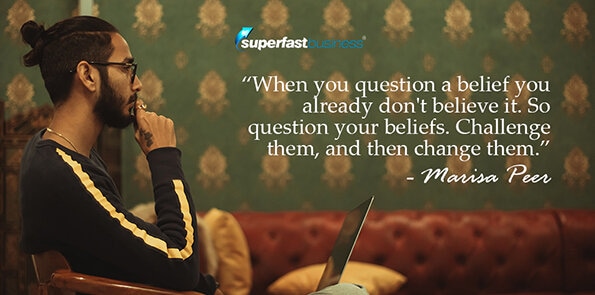Our perceptions of money and its value are significantly shaped by our early experiences and teachings, often imparted by our parents. Take, for instance, the belief that money is the root of all evil, a viewpoint that can hinder personal and financial growth.
Marisa Peer, a renowned therapist, specializes in changing such ingrained belief systems, enabling individuals to achieve greater freedom, fulfillment, and prosperity. Her approach is distinguished by its focus on identifying and addressing the emotional roots of these beliefs, which are frequently established during childhood.
Podcast: Download (Duration: 49:26 — 45.4MB)
Get Notified Of Future Episodes Apple Podcasts | Spotify | Amazon Music | Android | Blubrry | Gaana | TuneIn | Deezer | Anghami | RSS | More
Table of contents
1. Getting to the root of money mindset
2. The stories behind the beliefs
3. What you should and shouldn’t say to your kids
4. The question of tech exposure
5. Rewriting that childhood programming
6. Are fantasy and make-believe bad?
7. Addressing the fear of what could happen
8. When the bad stuff drives you to succeed
9. Things kids pick up
10. Want more of Marisa?
Build the business and life you want with James’s help
Getting to the root of money mindset
James would like to talk with Marisa about money mindset – how people’s ability to make and keep money is influenced by their early experiences and the beliefs they inherit from family narratives.
These beliefs, says Marisa, are often rooted in sayings or situations involving family members, and can shape one’s financial behaviors from a young age. Attitudes towards money, she suggests, are learned and can be traced back to specific moments in childhood.
Marisa has a client, for instance, who struggles with billing customers. This client vividly recalls her mother teaching her to lie to her dad for money.
Marisa’s own father once threw money at her in a rage, hence her vow to never depend on others for money. Childhood experiences, she says, can create lasting financial blocks.
These ingrained money mindsets, asserts Marisa, can be reversed by questioning and understanding the origins of one’s beliefs. She herself went from rejecting financial assistance to appreciating gestures of support from her husband through a process of self-reflection.
The stories behind the beliefs
Marisa grew up in a tumultuous household, with a hysterical mother and an emotionally distant father. She and her siblings each developed distinct coping mechanisms and beliefs based on what they saw of their parents’ relationship.
Marisa mirrored her father’s behavior, choosing an engrossing job that could distract from emotional pain. And she struggled with maintaining relationships, always anticipating their end.
Her perspective began to shift when a client credited her with saving his marriage. Marisa’s husband was a lucky man, he said, unaware that she had none.
This prompted Marisa to reevaluate her beliefs about relationships. She realized that her anticipation of relationship failure was a self-fulfilling prophecy rooted in her childhood observations.
By confronting and changing this belief, Marisa opened herself up to lasting happiness in her personal life, eventually marrying and finding contentment.
Likewise, says Marisa, financial beliefs and attitudes towards money are formed early. Hence the challenges often faced by people, including celebrities, in managing wealth.

Marisa speaks of common pitfalls, such as squandering one’s earnings or failing to engage with financial planning, as manifestations of deeper, unaddressed beliefs about money.
By advocating for a more open, positive approach to financial discussions and management, Marisa underscores the need to confront and revise one’s deep-seated beliefs to achieve personal and financial well-being.
What you should and shouldn’t say to your kids
James reflects on the impact of his parents’ and grandparents’ teachings, some of which he credits with putting him in a better place now than some of his peers.
As a parent of five, he’s been around a lot of other parents, and heard casual remarks or misleading comments that he realizes could be highly damaging to children.
James is pleased to tell Marisa of his daughter once saying to him: Daddy, I am enough. Yes, you are, Sweetie, he responded. It highlights the positive impact of reinforcing affirming messages, and not inadvertently instilling feelings of inadequacy or unworthiness in children.
Can parents’ work habits affect children’s feelings of self-importance and their understanding of work-life balance?
Marisa affirms this, and stresses the importance of framing work not as a preference over family time but as a necessary and enjoyable part of life that does not outweigh love for one’s children.
Marisa further addresses the concept of financial literacy and responsibility from a young age, proposing parents teach children the value of money and effort through achievable tasks and rewards.
This strategy not only demystifies the concept of earning and spending but also avoids instilling a negative or fearful perception of financial management.
By encouraging tasks that are engaging and rewarding, parents can help their children associate money-making with positive experiences, thereby laying the foundation for a healthy, confident approach to financial decisions and self-reliance in the future.
The question of tech exposure
In James’s context of online business, where children are naturally exposed to technology, should parents be concerned about the extent of this exposure?
Marisa knows a lot of tech giants restrict Wi-Fi access in their children’s bedrooms, knowing how addictive technology is.
The digital age poses a lot of challenges, says Marisa, among them the superficiality of online friendships, the phenomenon of online-only relationships, and the threat of cyberbullying.
Given, there are benefits of technology, like keeping in touch with distant family members. However, Marisa warns of the potential negative outcomes for young people who lead their social and romantic lives exclusively online, indicating a need for balance and caution.
Rewriting that childhood programming
How possible is it, asks James, to alter beliefs instilled in us during childhood?

Marisa Peer is quite positive, emphasizing the power of introspection and challenge in reshaping one’s foundational beliefs. She illustrates this by debunking common misconceptions, such as the notion that men don’t appreciate strong women. Counterexamples like Michelle Obama, she says, encourage people to reassess and question the validity of their ingrained perceptions.
Marisa further discusses self-confidence and the positive reception it inspires in various aspects of life, including professional contexts. People want to know you’re good at what you do. She advocates, however, for a balanced perspective on self-worth, teaching children to recognize their unique talents without feeling superior or inferior to others.

This approach not only fosters a healthy self-image but also encourages a constructive and inclusive outlook on personal capabilities and achievements.
Are fantasy and make-believe bad?
Marisa champions the value of fantasy and make-believe for both children and adults. She points out the wisdom of Roald Dahl, who celebrated the magic of belief, and the enriching worlds of fiction like Harry Potter and Star Wars.
Marisa posits that engaging with these imaginative realms offers a vital escape and enhances our love for reading and storytelling. A life strictly confined to reality, she believes, would lack depth and wonder.
Expanding on the power of belief, Marisa argues that our convictions shape our reality, influencing our physical and emotional responses. Take, for instance, individuals who overcome illness through visualization. And what of the physical manifestations of our thoughts, such as blushing or crying?
This underscores Marisa’s view that the essence of make-believe does not detract from our understanding of truth; rather, it enriches our lives by allowing us to experience and interact with the world in profound and meaningful ways.
Addressing the fear of what could happen
Marisa addresses the common fear among entrepreneurs of losing everything overnight. Such anxiety, she says, stems from negative programming and misconceptions about success and security in self-employment.
Marisa encourages entrepreneurs to focus on their ability to rebuild and innovate, leveraging their experience and the templates they’ve created for building businesses. This perspective shifts the focus from fear to confidence in one’s capabilities and resilience.

To illustrate the concept of continuous innovation rather than the need for original invention, Marisa shares her own experience of overcoming the one-book hurdle to authoring eight books. She cites, too, the example of Sara Blakely’s Spanx as an improvement on an existing product.
This emphasizes the idea that entrepreneurship is not necessarily about inventing something new but about enhancing what already exists, a constructive approach to dealing with entrepreneurial anxiety.
When the bad stuff drives you to succeed
James has observed that a challenging or traumatic past often fuels a powerful motivation to succeed. Can Marisa comment on this?
This “I’ll show you” mindset, says Marisa, can be sparked by early life adversities or discouraging remarks, pushing individuals to prove their detractors wrong.
Furthermore, those who have grown up under the thumb of controlling parents may develop a strong desire for autonomy, leading them to establish their own businesses or empires to escape the prospect of working for others and to exert control over their own destinies.
Marisa also shares her personal approach to innovation within her field, drawing inspiration from Einstein’s idea of simplification. She applied this concept to therapy, questioning the need for complexity and length in traditional methods and aiming to make therapy more accessible and efficient, much like a dentist treats a toothache without requiring a lengthy relationship with the patient.
This approach, along with Wayne Dyer’s insight that changing perspectives can transform reality, underscores the power of mindset in overcoming challenges and achieving success.
Things kids pick up
Marisa applauds James for his exceptional role as a father, pointing to the profound impact parents have on their children’s development and future paths.
The ability of James’s oldest son to teach selling at work with ease, learned from his father’s teachings and presence, exemplifies the unconscious absorption of skills and attitudes by children.
This natural acquisition underscores the importance of positive role modeling in parenting.
Marisa reflects on her personal and professional life, noting how her own career choice was influenced by her father’s example of helping others, and how her daughter pursued art, inspired by Marisa’s demonstration of branding and messaging.
These examples serve as reminders of the significant and lasting influence parents have on their children’s interests, values, and careers. Marisa encourages parents to be mindful of this impact, and to consciously guide their children in positive ways, understanding that every interaction has the potential to shape their future.
Want more of Marisa?
For those intrigued by Marisa and her work, she offers a wealth of resources across various platforms. Her eight books, including “Tell Yourself A Better Lie,” provide insights into overcoming personal and professional hurdles. Interested individuals can find free audios on eliminating blocks related to money, relationships, or wealth at marisapeer.com.
Additionally, Marisa offers training for those looking to become RTT therapists, without the need for a lengthy educational background, in therapy at rtt.com.
For further inspiration and to join the “I Am Enough” movement, visit iamenough.com, where you can find stories and motivational bracelets.
Become one of the successful entrepreneurs inside JamesSchramko membership









Leave a Reply